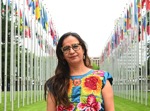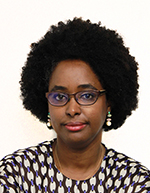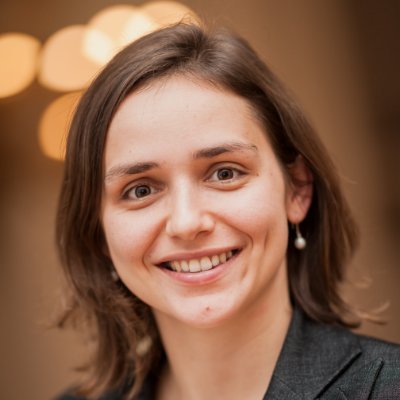Members
Working Group on Enforced or Involuntary Disappearances
Ms. Ana Lorena Delgadillo Perez (Mexico), appointed in 2023

Ana Lorena Delgadillo is a Mexican human rights lawyer with over 20 years of expertise in women’s and migrants’ rights, disappearances, femicides, criminal justice system, independence of judiciary, militarization, and citizen security. Through her work with public administration and civil society, Delgadillo has contributed to law and policy as well as greater public recognition of the plight of victims of grave human rights violations in Mexico and Central America related to impunity and the lack of rule of law.
As investigator at the Mexico City Human Rights Commission, Delgadillo promoted standards for comprehensive reparation, effective investigation, and the independence of expert services. She worked at the National Commission to Prevent and Eradicate Violence against Women in Ciudad Juárez and Chihuahua as Director of the Truth and Justice area and later joined the Argentine Forensic Anthropology Team (Equipo Argentino de Antropología Forense, EAAF) to undertake one of Mexico’s most high profile early femicide cases: identification of the remains of women murdered in Ciudad Juárez and Chihuahua, Chihuahua. She served as affidavit witness on the case González et al vs México (the “Cotton Field” case) before the InterAmerican Human Rights Court to provide evidence on the obstacles to investigate the femicide cases and the difficulties families of the murdered women faced in their pursuit of search and justice.
As Deputy Attorney General in the Office for Attention to Victims of Mexico City, Delgadillo advanced measures for the search of missing and disappeared persons, protocols for services for victims, and participated in the drafting of the Law of Access of Women to a Life Free of Violence. With the EAAF’s Border Project, she participated on the creation of the Forensic Data Base for Missing Migrants in El Salvador and Oaxaca, Mexico. She helped draft Mexico’s federal General Victims’ Law.
In 2011, she founded and currently serves as Executive Director at the Foundation for Justice and Democratic Rule of Law (Fundación para la Justicia y el Estado Democrático de Derecho), a regional non-governmental organization with headquarters in Mexico City and representatives in El Salvador, Guatemala, and Honduras. At FJEDD she leads national discussions on the transformation of Mexico’s justice system in coordination with peer civil society organizations. Together with collectives of families and other non-governmental organizations, the FJEDD advocates for more efficient public policies for the identification, search, and justice for disappeared Mexican and Central American migrants that has resulted in the creation of national units such as the Forensic Commission, the Support Mechanism for searching and investigating cases of missing migrants, and the National Search Unit. Under her leadership, FJEDD has written and published more than 25 reports on different human rights issues.
Delgadillo holds a Law Degree from Mexico’s Escuela Libre de Derecho. Her opinion is frequently heard on national and regional news analysis programs. She has been a guest lecturer at the University of Arizona on femicide and disappearances of women, as well as at Mexico’s National Autonomous University’s Criminal Justice Seminars.
Ms Aua Balde (Guinea-Bissau), appointed in 2020

Ms Aua Baldé has an expertise in international human rights law, in particular the African Human Rights systems, and is the author of O Sistema Africano de Direitos Humanos e a Experiência dos Países Africanos de Língua Oficial Portuguesa, (UCP/2017). She has also published more broadly in human rights and her work experience reflects her expertise, including a position as a Visiting Professional at the International Criminal Court and various roles within the United Nations system. Notably, she has worked as an Information Analyst Officer at both the United Nations Multidimensional Integrated Stabilization Mission in the Central African Republic and at the United Nations Operation in Côte d'Ivoire, as well as Political Affairs Officer for the United Nations Integrated Peacebuilding Office in Guinea-Bissau. She has also worked for the NGO Tostan in Senegal and as a Legal Adviser to the Minister of Education in Guinea-Bissau. She currently holds the position of special invited lecturer and researcher at the Catholic University of Portugal, where is she a PhD candidate conducting her doctoral research in international criminal law. Ms. Baldé has also been guest lecturer at several other universities for international criminal law; international humanitarian law; international human rights law, in particular the African human rights system. She has been admitted to the Portuguese and Bissau-Guinean Bar Associations. Ms. Baldé holds a law degree from the Autonomous University of Lisbon, a post-graduate diploma in human rights from Coimbra University and a post-graduate diploma in international humanitarian law and human rights in conflict situations from the University of Lisbon and the National Defense Institute of Portugal. Ms. Baldé also holds a master’s in law degree with specialization in international human rights law from Harvard Law School.
Ms. Grażyna Baranowska (Poland), Vice-Chairperson, appointed in 2022
Ms. Grażyna Baranowska is an Assistant Professor at the Polish Academy of Sciences. She also leads a project on missing migrants at the Hertie School in Berlin, funded by the European Union through Marie Skłodowska-Curie Actions. The project seeks to identify and interpret international legal obligations regarding ‘missing migrants’ and accordingly critique and shape the practices of the EU, its Member States, and pertinent international organisations. Her research and teaching cover several topics in the areas of international law, international human rights law, and migration law, with special focus on disappeared and missing persons, border violence, and memory laws. In 2021, her book “Rights of Families of Disappeared Persons: How International Bodies Address the Needs of Families of Disappeared Persons in Europe” was published by Intersentia. She held fellowships inter alia from the European Union, German Bundestag, Polish Ministry of Science and Higher Education, Foundation for Polish Science, Stiftung Mercator and Poland’s National Science Centre. Next to her academic activities, she has worked as a Policy Advisor on enforced disappearances in the German Institute for Human Rights and was involved in drafting the General Comment on enforced disappearances and migration of the UN Committee on Enforced Disappearances. She has also advised and trained litigators to UN bodies and the European Court of Human Rights and made submissions to the European Court of Human Rights in migration cases. In the past, she designed and directed several courses International Protection of Human Rights in Poland.
Ms. Gabriella Citroni (Italy), Chairperson, appointed in 2021

Ms. Gabriella Citroni is Adjunct Professor of International Human Rights Law at the University of Milano-Bicocca (Italy). She is also lecturer at the Geneva Academy of Humanitarian Law and Human Rights (Switzerland), holding a course on “Enforced Disappearances in International Law” for LL.M. students. She has been invited professor and imparted courses on international human rights and transitional justice at several universities worldwide, including the university Panthéon-Assas (Paris, France), the university of Aix-Marseille (Aix-en-Provence, France), the Pontificia Universidad Católica del Perú (Lima, Perù), and the Academia Interamericana de Derechos Humanos (Saltillo, Mexico). She has cooperated, as legal advisor, with several NGOs providing legal assistance to victims of gross human rights violations and their relatives in different countries and delivering trainings to human rights defenders and local practitioners. In this realm, she is the senior legal advisor of TRIAL International. From 2003 to 2005, Ms. Citroni was a member, as legal advisor, of the Italian delegation at the United Nations during the negotiations of the International Convention on the Protection of All Persons from Enforced Disappearance. She researches and has published extensively on subjects related to international human rights law. She has been appointed as expert witness before the Inter-American Court of Human Rights in three prominent enforced disappearance cases. Ms. Citroni has been an external consultant in charge of researching and drafting studies on issues related to enforced disappearance for different international institutions, including the Commissioner for Human Rights of the Council of Europe; the Office for Democratic Institutions and Human Rights of the Organization for Security and Cooperation in Europe; and the International Committee of the Red Cross.
A list of former members is available here (scroll down to ‘Working Group on Enforced and Involuntary Disappearances).
